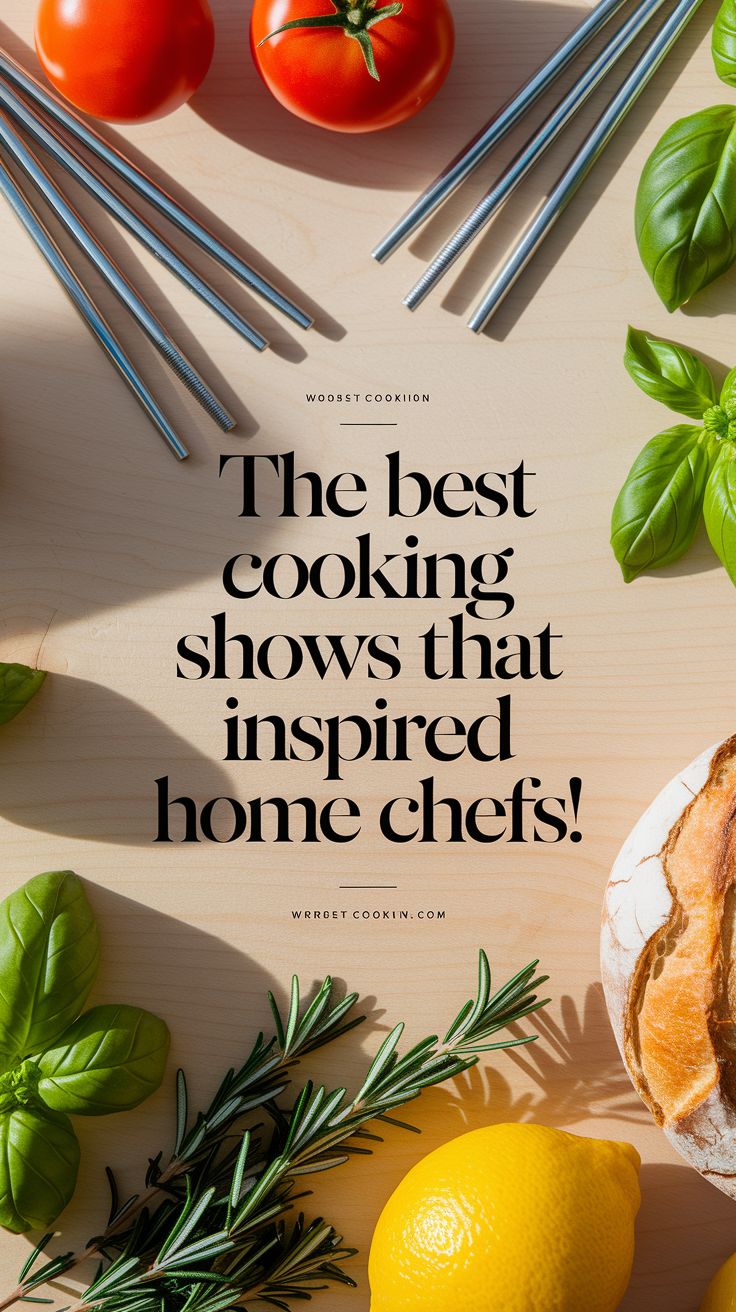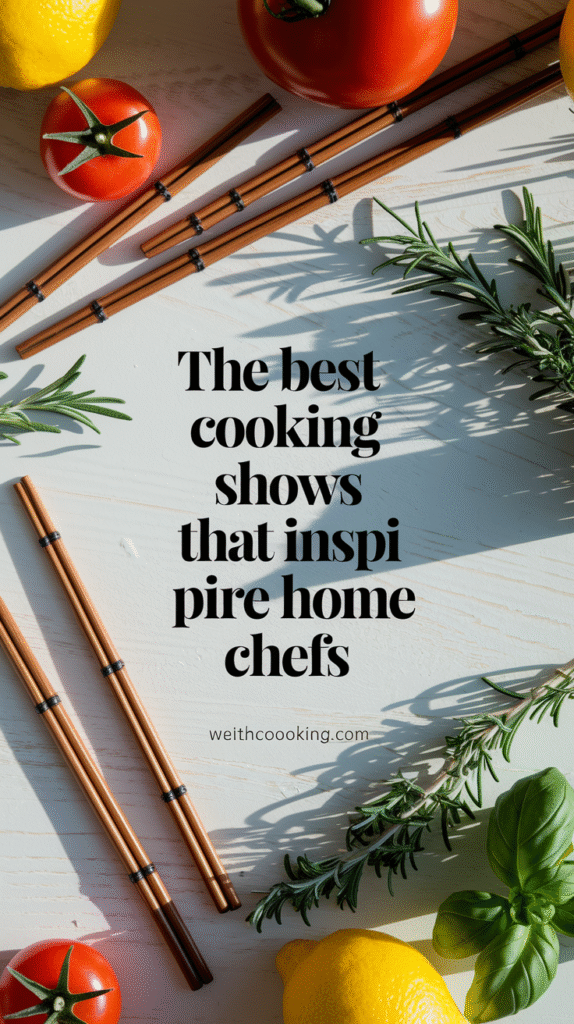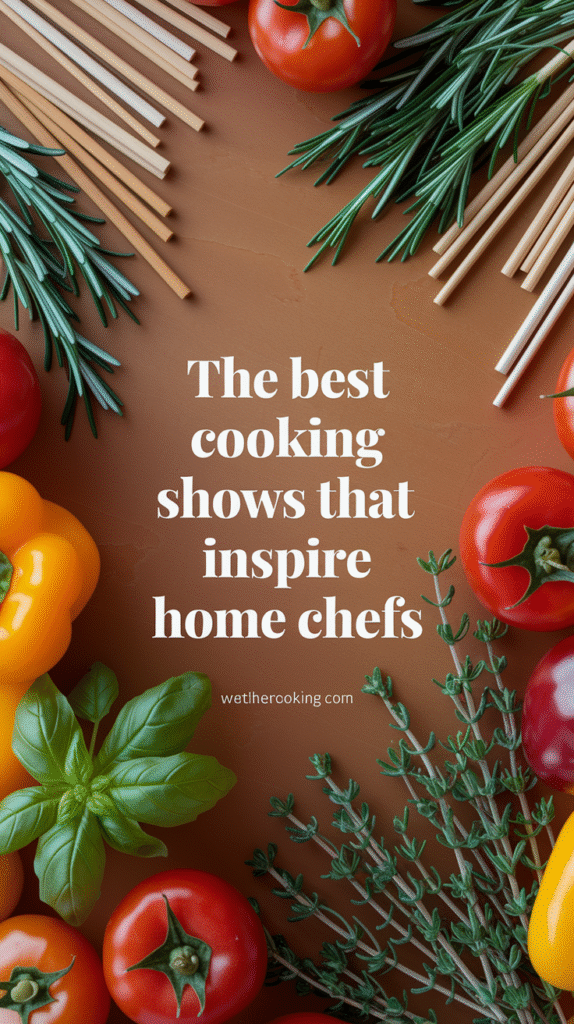Are you passionate about cooking but unsure where to find inspiration? Right now, there are countless cooking shows that can elevate your culinary skills, ignite your creativity, and bring fun to your kitchen. Check out the best cooking shows that not only entertain but also inspire home chefs like you.
Let’s dive into some standout cooking shows that you can watch to enhance your cooking prowess.
Top Cooking Shows for Aspiring Chefs
- MasterChef – One of the most popular cooking competitions, MasterChef showcases home cooks competing for the title of MasterChef. Contestants face various cooking challenges, judged by professional chefs. Watching this show helps you learn techniques and gain confidence.
- The Great British Bake Off – If you have a sweet tooth, this show is perfect for you. The Great British Bake Off focuses on baking desserts and pastries while celebrating creativity and camaraderie among contestants. You’ll pick up baking tips and feel inspired to try new recipes.
- Chopped – This thrilling cooking competition features four chefs who face off in timed rounds using mystery ingredients. Chopped is an excellent source for learning how to think on your feet in the kitchen and improvise dishes with unexpected ingredients.
- Chef’s Table – For a more artistic approach to cooking, check out Chef’s Table. This beautifully shot series explores the journeys of world-renowned chefs and their unique cooking philosophies. It will inspire you to think about your cooking not just as a task but as a form of art.
- Rachel Ray’s 30 Minute Meals – If you’re pressed for time, Rachel Ray’s 30 Minute Meals provides quick and easy recipes that save time without compromising flavor. You’ll learn how to prepare delicious meals efficiently, perfect for busy weeknights.
Why Cooking Shows Matter
Cooking shows do more than just entertain. They offer valuable learning experiences that can help you in many ways:
- Skill Development: Regularly watching cooking shows introduces various cooking techniques and styles, allowing you to expand your skill set.
- Recipe Inspiration: These shows provide a wealth of recipes that you can try in your kitchen. You never know when you’ll find a new favorite dish.
- Culinary Confidence: Seeing others create delicious meals can encourage you to experiment and step out of your comfort zone.
- Entertainment: Cooking shows are not only educational but also engaging, making them great to watch alone or with family and friends.
How to Make the Most of Cooking Shows
To truly benefit from these cooking shows, consider the following tips:
- Take Notes: Keep a notebook handy to jot down recipes or techniques you want to try later.
- Practice Regularly: Apply what you learn by cooking along or recreating recipes at home.
- Engage with Community: Join online forums or social media groups related to these shows, where you can share your attempts and seek advice.
Additional Resources for Cooking Inspiration
To continue building your culinary skills, explore these resources:
- Food Network – Offers a plethora of recipes, cooking tips, and show guides.
- AllRecipes – A user-friendly site with crowd-sourced recipes and reviews.
- Serious Eats – Great for in-depth discussions on cooking techniques and food science.
As you explore these shows and resources, remember that cooking is a journey. It’s about experimenting, learning, and enjoying the process, so don’t hesitate to have fun in the kitchen. You never know – your next culinary masterpiece could be just a show away.
How Cooking Shows Influence Culinary Trends
Cooking shows have become a pivotal part of food culture, significantly influencing culinary trends across the globe. They provide viewers with not only techniques and recipes but also inspiration that shapes food preferences and dining habits. These shows have the ability to promote specific ingredients, cooking styles, and even dining experiences that resonate with both amateur cooks and professional chefs.
One of the primary ways cooking shows impact culinary trends is through popularizing ingredients. For example, shows like Food Network often showcase trendy superfoods, seasonal produce, and unique flavor combinations. As the audience watches these chefs create vibrant dishes, they become curious and eager to find those ingredients in their local grocery stores. This curiosity drives ingredient sales, prompting retailers to stock up on trendy items that viewers may want to try at home.
In addition to ingredients, cooking shows also highlight new cooking techniques and methods. As chefs demonstrate the latest sous-vide techniques or the art of fermentation, viewers feel encouraged to experiment in their kitchens. These shows can transform traditional cooking styles, making them more accessible and appealing. The rise of plant-based cooking, prominently featured in shows such as Chef’s Table: BBQ, showcases how culinary trends shift towards healthier and sustainable eating habits.
Another significant influence of cooking shows is the focus on cultural cuisine. Many programs delve into global culinary traditions, and as they do, they educate viewers about the diverse ingredients and cooking methods used in various cultures. According to a Nielsen report, as viewers gain exposure to international dishes, there is an increase in dining out at restaurants that serve these cuisines, further driving culinary explorations.
Cooking competitions, such as those featured in Top Chef, play a crucial role in trendsetting as well. Contestants often showcase creative takes on traditional dishes, which encourages others to replicate or innovate on these concepts. The competitive element introduces excitement and keeps viewers engaged, further propelling culinary trends through social media. Participants frequently share their experiences and recipes on platforms like Instagram, influencing their followers who may want to replicate the dishes.
Embracing Sustainable Cooking
As awareness of environmental issues grows, cooking shows have started integrating sustainable practices and food sources into their narratives. Many chefs stress the importance of using local produce and ethically sourced ingredients. This trend responds not only to a growing consumer demand for sustainability but also reshapes the food industry by encouraging more responsible dining choices.
How Social Media Amplifies Cooking Show Trends
Cooking shows do not exist in a vacuum; they thrive in a digital ecosystem where social media amplifies their reach. Platforms like Instagram and TikTok allow fans to share their versions of dishes they see on television. This user-generated content often opens up dialogues around trends, making certain dishes go viral. Hashtags like #FoodTok and #HomeCooking provide community members a way to connect and share their culinary creations, further permeating the trends initially set by cooking shows.
Moreover, shows often inspire challenges on social media, such as recreating a dish in under 30 minutes or utilizing minimal ingredients. These challenges encourage participation and experimentation among viewers, making cooking fun and interactive.
Ultimately, cooking shows have become an essential element in shaping culinary trends. Through ingredient promotion, technique demonstrations, exposure to cultural cuisines, and harnessing social media influence, these shows inspire new generations of cooks. Whether you are tuning in to learn how to whip up a dish or simply to be entertained, the impact of these cooking shows extends well beyond the kitchen.
As the intersection of entertainment and culinary arts continues to evolve, expect the influence of cooking shows on food trends to become stronger and more dynamic. The future of food culture is bright, and cooking shows are certainly leading the charge.
Behind the Scenes: What Makes a Cooking Show Successful
The world of cooking shows captivates viewers with delicious recipes, stunning visuals, and engaging personalities. But what really makes these shows successful? Behind the scenes, there are several key elements that contribute to the magic of cooking television. Let’s dive into what makes a cooking show shine.
Engaging Hosts
The host is often the face of the show. Their charisma and personality play a crucial role in drawing in viewers. A great host does more than just cook; they connect with the audience. They share stories, offer relatable moments, and create a welcoming atmosphere that makes you feel at home in your own kitchen. Think of beloved figures like Ina Garten or Jamie Oliver, who have mastered this art.
High-Quality Production
Production quality can make or break a cooking show. High-definition cameras, expert lighting, and professional sound design create an immersive experience for viewers. Production teams spend a lot of time planning shots, setting the scene, and ensuring that every dish looks delectable on screen. This visual appeal is vital in showcasing the beauty of freshly prepared meals. For great examples of high-quality production, look no further than Nailed It!.
Compelling Storylines
Every successful cooking show features engaging storylines. Whether it’s a cooking competition, a travel-themed food journey, or a personal story of culinary heritage, these narratives draw viewers in emotionally. They crave not just recipes, but also context—whether that’s the background of a dish or the struggles and triumphs of the chef. Shows like Mind of a Chef beautifully blend cooking with storytelling.
Diverse Recipes and Techniques
Viewers love variety. A successful cooking show explores diverse cuisines, techniques, and dietary preferences. This not only keeps content fresh and exciting but also appeals to a broader audience. Including vegan, gluten-free, or international dishes invites more viewers to engage with the content. It’s essential for shows like Chopped to introduce different challenges, showcasing innovative cooking techniques.
Interactive Elements
In today’s digital age, interactive elements bring cooking shows to life. Many shows leverage social media to engage viewers by encouraging them to try recipes, share their results, or participate in online cooking challenges. Hosting live Q&A sessions or adding a call-to-action can make audiences feel included, enhancing their viewing experience.
Authenticity and Passion
Authenticity is key. Audiences resonate with hosts who display genuine passion for cooking. When a chef is excited about a dish, that enthusiasm encourages viewers to try it themselves. Cook shows that feature home cooks or professionals sharing real-life experiences build credibility and trust among audiences. Take a look at BBC Food, where authentic passion is palpable in the diverse range of chefs presented.
Building a Community
Successful cooking shows build a community. Successful shows create a loyal fan base that interacts with each other and the host. This can be through social media platforms, dedicated forums, or cook-along events. Connecting viewers to a shared passion for cooking fosters collaboration, inspiration, and friendship among food lovers.
Key Ingredients for Successful Cooking Shows
| Element | Description |
|---|---|
| Engaging Hosts | Charismatic personalities that connect with viewers. |
| High-Quality Production | Visually appealing settings and professional cinematography. |
| Compelling Storylines | Narratives that draw viewers into the cooking experience. |
| Diverse Recipes | Variety in cuisines and techniques that appeal to a broad audience. |
| Interactive Elements | Engagement through social media and viewer participation. |
| Authenticity | Genuine passion that resonants with audiences. |
| Building Community | Creating a loyal fanbase that interacts with each other. |
These elements come together to create an unforgettable cooking show that captures hearts and inspires culinary adventures at home. Whether you’re a seasoned chef or just starting, these shows help you discover new recipes, techniques, and the joy of cooking itself.
The Role of Cultural Representation in Cooking Programs
Cooking programs have become a significant part of our daily lives, not just for culinary enthusiasts but also for those seeking entertainment and cultural insights. As the popularity of these shows grows, so does the importance of cultural representation in the kitchen. The way different cultures portray their culinary traditions is vital for showcasing diversity and fostering understanding.
In cooking shows, you often find hosts from diverse backgrounds sharing their unique approaches to food. This diversity enriches viewers’ experiences and provides a platform for underrepresented cultures. When you watch a show featuring an Afghan chef preparing traditional dishes, for instance, you not only learn about their recipes but also immerse yourself in their story and culture.
One significant impact of cultural representation in cooking programs is the promotion of inclusivity. Here are a few ways cultural representation plays a role:
- Education: Cooking shows are a powerful medium for education. They inform audiences about various ingredients, techniques, and culinary traditions that might otherwise remain unknown. This learning greatly broadens viewers’ perspectives.
- Breaking Stereotypes: Many cooking shows challenge preconceived notions about certain cuisines or cultures. For instance, showcasing authentic Mexican cooking, as done in shows like “Mexico – One Plate at a Time”, allows audiences to see the richness beyond the typical tacos and nachos often associated with Mexican food.
- Community Building: These programs often create a sense of community among viewers. People from similar backgrounds can connect with the shows, while those from different cultures can foster a greater appreciation and respect.
Another critical aspect is how cultural representation in these shows impacts the industry itself. Diverse hosts and chefs are vital for widening the appeal of culinary programming. Shows featuring a mix of cultures can attract a larger audience, interested in various cooking styles and traditions. Programs like “Top Chef” and “Chef’s Table” not only highlight established chefs but also uplift emerging talents from diverse backgrounds.
Moreover, many people view cooking as an art form, similar to painting or music. Just like artists portray their cultural backgrounds and experiences through their works, chefs do the same with food. By sharing personal stories related to recipes, chefs can engage the audience on a deeper emotional level. For instance, when Southern chefs discuss their ancestry through dishes, they convey a narrative that connects food to heritage and identity.
The integration of cultural representation in cooking programs is not without challenges. Some shows may fall prey to cultural appropriation, which occurs when individuals or companies adopt elements of one culture without understanding or respecting the original context. This misuse may lead to misrepresentation and dilute the richness of the culture being showcased. It’s crucial for producers to engage with cultural experts and communities when creating content, ensuring authenticity and respect.
Here is a simple table that illustrates some of the best cooking shows known for their cultural representation:
| Show Title | Host/Chef | Culture Represented |
|---|---|---|
| Aarti Party | Aarti Sequeira | Indian |
| The Kitchen | Various | American |
| Eddie Jackson’s BBQ on the Beach | Eddie Jackson | Southern American |
| Southern at Heart | Jeff Mauro | Southern American |
Ultimately, cultural representation in cooking programs goes beyond just recipes. It brings an understanding of traditions, fosters empathy, and connects people through shared experiences. As viewers become more aware of the rich tapestry of global cuisines, the cooking show landscape will continue to evolve, reflecting the world’s diversity. Fostering these connections drives home the point that food is not only about sustenance but also about community, culture, and identity.
Tips for Learning Cooking Skills from Television Shows
Learning cooking skills from television shows can be an enjoyable and effective way to enhance your culinary abilities. With a plethora of cooking programs available, they serve as both entertainment and a source of education. Here are some tips to help you maximize your learning from these shows.
Choose the Right Shows
Selecting the right cooking shows is crucial for effective learning. Some shows focus on techniques, while others emphasize specific types of cuisine. Here are a few popular shows to consider:
- Chopped – A competitive show that challenges chefs to utilize given ingredients.
- MasterChef – Home cooks compete for the title, offering insights into various cooking techniques.
- The Great British Bake Off – A baking competition that showcases baking skills, techniques, and recipes.
Engage with the Content
To truly benefit from cooking shows, it’s important to engage actively. Here are some ways to do that:
- Take Notes: Write down key techniques or tips you find helpful.
- Follow Along: Cook the recipes as you watch. This helps reinforce what you learn.
- Ask Questions: Engaging with online communities can provide a deeper understanding. Forums like Reddit Cooking allow you to share experiences and seek advice.
Practice, Practice, Practice
Watching cooking shows is just the first step. To develop your skills, practice is essential. Here are some effective strategies:
- Recreate Recipes: Choose recipes from your favorite shows and try to make them at home.
- Experiment: Use the techniques you’ve learned to create your own dishes.
- Record Your Progress: Keep track of your successes and areas for improvement.
Utilize Social Media
Social media platforms are excellent resources for learning cooking skills from television shows. Follow chefs or cooking shows on Instagram, Facebook, and TikTok. This way, you can find tips, behind-the-scenes content, and recipe ideas. Engaging with the community can also lead to new ideas and inspiration.
Consider Cooking Competitions
If you find yourself inspired after watching cooking competitions, consider participating in local cooking contests. These events not only motivate you to refine your skills but also allow you to gather feedback from judges and peers, elevating your cooking game.
Invest in Good Equipment
Having the right tools can make a significant difference in your cooking journey. You don’t need every gadget, but investing in some essential tools can improve your cooking experience:
- High-quality chef’s knife
- Cutting board
- Cast iron skillet or non-stick pan
- Measuring cups and spoons
Learn the Science Behind Cooking
Understanding the basic science of cooking can enhance your skills. Shows like America’s Test Kitchen explain why certain techniques work. Learning about flavor combinations, heat transfer, and ingredient interactions can make you a more intuitive cook.
Watch with Friends or Family
Cooking can be a social experience. Invite friends or family to watch cooking shows with you. This not only makes it more fun but also enables you to share experiences and learn from one another. After the episodes, plan a cooking session where everyone can contribute a dish and enjoy the time spent together.
Stay Updated
Cooking trends evolve over time. Stay updated by watching new episodes and following culinary news websites. This way, you can incorporate the latest trends and techniques into your cooking repertoire.
By following these tips, you can make the most out of cooking shows and become a more skilled and confident chef. Embrace the journey of learning, and enjoy every moment of cooking!
Conclusion
Cooking shows have become a vital part of culinary culture, offering both entertainment and education to home chefs around the world. They inspire enthusiasts to explore their own kitchens, incorporating new techniques and flavors that reflect the diverse array of culinary traditions. As we’ve seen, these shows not only highlight the latest gastronomic trends but also play a crucial role in shaping our understanding of global cuisines. By featuring various cultural representations, they foster appreciation for the rich tapestry of food traditions, helping to break down barriers and celebrate diversity.
Behind the scenes, the success of these shows hinges on engaging storytelling, charismatic hosts, and high production values, all of which draw viewers in and keep them coming back for more. Whether you’re a novice cook or someone who has been in the kitchen for years, there are valuable lessons to be learned from watching. The tips discussed throughout this article provide practical ways to harness the power of these programs to refine your own cooking skills.
So, why not dive into the world of cooking shows? With a plethora of options available, you’re bound to find programs that resonate with your tastes while offering new insights into the art of cooking. Whether it’s mastering a classic dish or experimenting with a bold new flavor, these shows can empower you to create memorable meals and bring excitement back into your cooking routine. Embrace the adventure and let these shows guide you as you explore the culinary landscape from the comfort of your home.






